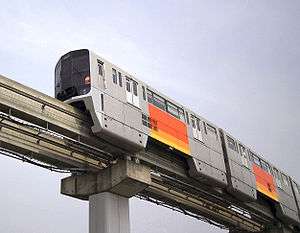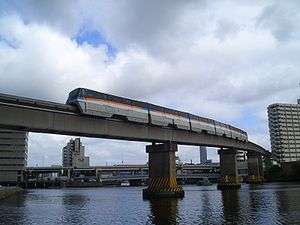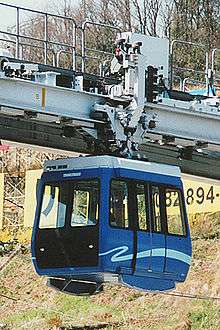Monorails in Japan
Here is an alphabetical list of monorails in Japan.
Currently operational
- Chiba Urban Monorail (Townliner): Chiba, Chiba, 1988. (suspended monorail)
- Disney Resort Line: Urayasu, Chiba, 2001.
- Kitakyūshū Monorail: Kitakyūshū, Fukuoka, 1985.
- Okinawa Monorail (Yui Rail): Naha, Okinawa, 2003.
- Osaka Monorail: Osaka, 1990. Second longest monorail line in the world.
- Skyrail Midorizaka Line: Aki-ku, Hiroshima, Hiroshima, 1998. (suspended monorail) A commuter line in a residential development suburb of the city. It is also considered as an automated guideway transit.
- Shōnan Monorail: Kanagawa, 1970. (suspended monorail)
- Tama Toshi Monorail Line: Tokyo, 1998.
- Toei Ueno Zoo Monorail: Tokyo, 1958. It links the two sectors of the zoo in Ueno Park.
- Tokyo Monorail: Tokyo, 1964. One of the world's most commercially successful monorail lines, carrying around 100 million passengers yearly.
Discontinued
- Nagoya Municipal Higashiyama Park Monorail, Nagoya, Aichi, 1964 — 1974.
- Himeji Municipal Monorail, Himeji, Hyōgo, 1965 — 1974.
- Meitetsu Monkey Park Monorail Line: Inuyama, Aichi, 1962–2008. It linked the Monkey Park to the nearest railway station.
- Odakyū Mukōgaoka-Yūen Monorail Line, Kawasaki, Kanagawa, 1965 — 2001.
- "Suspended Train" at the Exhibition of Transportation and Electricity in Osaka, 1928. Operated only for a week, from November 28 until December 3. It was the first monorail in the nation, as well as the only one in the pre-war period.
- Yokohama Dreamland Monorail, Kanagawa, 1966 — 1967.
- Yomiuriland Monorail, Kanagawa and Tokyo, 1964 — 1978.
Other monorails
- Slope cars are small automated monorails found in the various parts of Japan. Unlike the monorails above, slope cars are not legally considered as railways. Similar concepts include Raxcars and Monoriders.
- There are also small industrial monorails used in various places, most notably in steep orchards, especially of mikan citrus. The first of its kind was invented in 1966.
- Vista liner is another type of monorail which is not legally a railway. The system is smaller than ordinary monorails, but larger than slope cars. Vista liners can be typically seen in amusement parks, such as Expo Land.
Automated guideway transits
Strictly speaking, these lines are not monorails, though they resemble one at first glance. The rail in the center of the track serve only to guide the train, not support it, so they don't qualify as monorails.
- Astram Line (Hiroshima Rapid Transit Hiroshima New Transit Line 1): Hiroshima, Hiroshima
- Linimo (Aichi Rapid Transit Tōbu Kyūryō Line): Aichi.
- Nagoya Guideway Bus Shidami Line (Yutorīto Line): Nagoya, Aichi.
- New Shuttle (Saitama New Urban Transit Ina Line): Saitama, Saitama.
- New Tram (Osaka Municipal Nankō Port Town Line): Osaka, Osaka.
- Peach Liner (Tōkadai New Transit Tōkadai Line): Komaki, Aichi. Already discontinued.
- Port Liner (Kobe New Transit Port Island Line): Kobe, Hyōgo.
- Rokkō Liner (Kobe New Transit Rokkō Island Line): Kobe, Hyōgo.
- Seaside Line (Yokohama New Transit Kanazawa Seaside Line): Yokohama, Kanagawa.
- Seibu Yamaguchi Line (Leo Liner): Tokorozawa, Saitama. A people mover Between Seibuen Park and Invoice Seibu Dome.
- Toei Nippori-Toneri Liner: Tokyo.
- Yamaman Yūkarigaoka Line: Sakura, Chiba.
- Yurikamome (Tokyo Waterfront New Transit Waterfront Line): Tokyo.
Photo gallery
-

Okinawa Monorail at Kenchō-mae Station
-

Toei Ueno Zoo Monorail in Tokyo
-

Tama Toshi Monorail
-

Tokyo Monorail across Shibaura
-

Chiba Urban Monorail
-
Shōnan Monorail near Ōfuna Station
-

Skyrail Midorizaka Line
-

Odakyū Mukōgaoka-Yūen Monorail, now closed. The photograph taken in 1990.
-

Ruins of Daishōgun Station, Himeji Municipal Monorail.
See also
This article is issued from Wikipedia - version of the 9/7/2016. The text is available under the Creative Commons Attribution/Share Alike but additional terms may apply for the media files.



